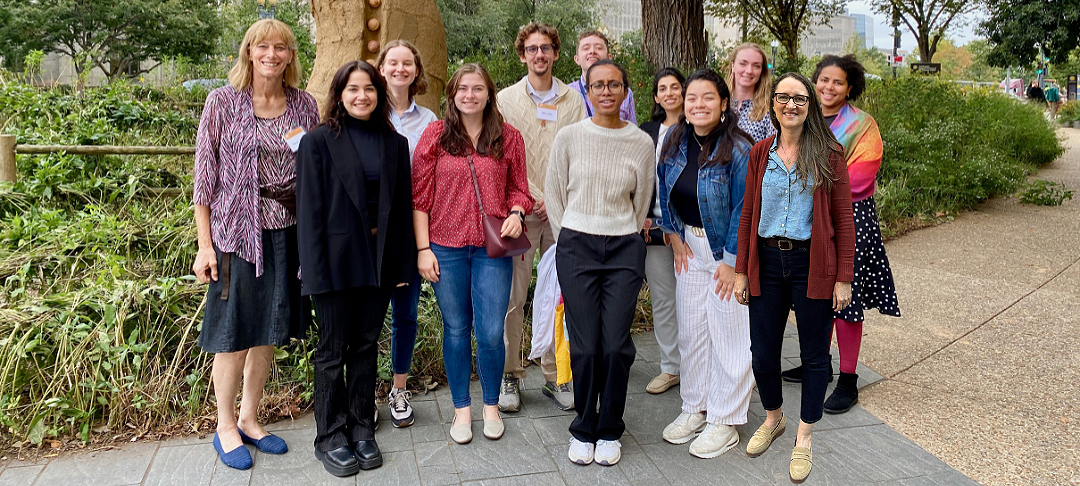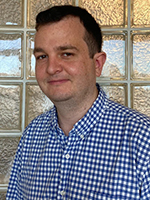Meet the Team


Tonya Jo Hanson White, M.D., Ph.D. is Chief of the Section on Social and Cognitive Developmental Neuroscience. Dr. White has an eclectic background as a researcher at the intersection between a number of different disciplines. These disciplines include engineering and medicine; pediatrics and child/adolescent psychiatry; epidemiology and developmental neuroscience.
Dr. White received a B.Sc. in Electrical Engineering (Magna Cum Laude) from the University of Utah and a M.Sc. in Electrical Engineering from the University of Illinois, Champaign/Urbana. Overlapping graduate school with medical studies, she received her medical degree from the University of Illinois College of Medicine (James Scholar) after which she completed a combined residency in Pediatrics, Psychiatry, and Child and Adolescent Psychiatry (Triple Board Program) at the University of Utah.
Following residency training, Dr. White spent a few years running a consultation/liaison child and adolescent psychiatry program at the Creighton/Nebraska Department of Psychiatry, before leaving to pursue a postdoctoral research fellowship at the University of Iowa under the mentorship of Nancy Andreasen, M.D., Ph.D.
She completed her postdoctoral research fellowship in 2001 and took a junior faculty position at the University of Minnesota, where she developed a joint research/clinical program in youth psychosis. In 2005, after being awarded a K08 award, she started work on a Ph.D. in bioengineering at the University of Minnesota. After moving to the Netherlands in 2009, she transferred her credits and completed her Ph.D. at the Erasmus University in the Netherlands in 2010.
She moved to the Erasmus University Medical Center in August of 2009 to build and direct a pediatric population-based neuroimaging program within the Generation R Study, which was a large epidemiological birth cohort which began in 2002. The neuroimaging program she set up was very successful, and by the time she moved to the National Institutes of Health, the program had collected more than 9000 magnetic resonance imaging scans in four waves of data collection. She left her 'leerstoel' (Professor of Pediatric Population Neuroimaging) at the Erasmus in July 2022 to join the National Institute of Mental Health (NIMH), where she currently heads the Section on Social and Cognitive Developmental Neuroscience (SoCoDeN).
Dr. White has over 300 publications and has received several different awards, including the Outstanding James Scholar Award from the University of Illinois College of Medicine, the Kempf Fund Award for Research Development in Psychobiological Psychiatry from the American Psychiatric Association, the 2016 Editor's Choice Award from the Journal Human Brain Mapping, and the 2024 Norbert and Charlotte Rieger Award for Scientific Achievement from the American Academy of Child and Adolescent Psychiatry.
Between 2017 and 2022, she served as a deputy editor of the Journal of the American Academy of Child and Adolescent Psychiatry and continues to serve as a consulting editor. She has had several positions within the Organization of Human Brain Mapping, including secretary of council and editor-in-chief of Aperture Neuro. She also has served on the Psychopharmacologic Drugs Advisory Committee of the US Food and Drug Administration.

Luke Norman, Ph.D. graduated in 2017 with a P.D. from King's College London, completed his postdoctoral training at the University of Michigan, and is currently a staff scientist with the SoCoDeN team. Dr. Norman’s research leverages functional neuroimaging, with a strong emphasis on big data and meta-/mega-analytic approaches, to investigate childhood neurodevelopmental and psychiatric conditions, including ADHD, autism spectrum disorder, and pediatric obsessive-compulsive disorder.

Jessica Ouyang, M.D. is a staff clinician for the Section on Social and Cognitive Developmental Neuroscience. Prior to NIMH, Dr. Ouyang worked as a clinical psychiatrist for more than 4 years with experience in integrated care in primary care, consult liaison psychiatry, outpatient child and adolescent psychiatry, group therapy, and teaching and advising trainees (medical students, residents, and fellows). She is a member of the American Academy of Child and Adolescent Psychiatry, where she is actively involved in the early childhood/infant mental health committee and Asian American mental health efforts.
She holds a Bachelor of Science in Bioengineering from the University of California at Berkeley and received her medical degree from Saint Louis University. In 2019, she graduated from the combined pediatrics, general psychiatry, and child & adolescent psychiatry program at Indiana University in Indianapolis, IN. In 2020, she completed the Women’s Mental Health fellowship with focus on the perinatal period and early attachment at Warren Alpert School of Medicine in Providence, RI.
In her free time, she enjoys traveling and making new friends around the world, eating (6 years and counting on Yelp Elite), socializing, staying active both physically and in her community. She also dabbles in watercolor, cooking, connecting with others, and learning random things from YouTube University.

Neda Sadeghi, Ph.D. is a neuroimaging scientist in the Section on Social and Cognitive Developmental Neuroscience. Dr. Sadeghi completed her Ph.D. in bioengineering at the University of Utah with a focus on early brain development. Dr. Sadeghi's neuroimaging research spans more than 15 years, involving subjects of different age groups, and patients with neurological and psychiatric disorders.
Dr. Sadeghi is passionate about leveraging the power of novel image analysis techniques and machine learning algorithms combined with longitudinal designs to improve our understanding of typical brain development, as well as differences arising from atypical development and their underlying mechanisms with a keen interest on the individual level predictions. She has also developed tools such as diffusion tensor-based morphometry that has been utilized to study conditions such as Down syndrome, traumatic brain injury, Hereditary Spastic Paraplegia, Moebius Syndrome, and atypical development.

Jasmin Bettina, Ph.D. is a researcher affiliated with the Section on Social and Cognitive Developmental Neuroscience (SoCoDeN). She completed her Master of Science at Heinrich Heine University, within the School of Mathematics and Natural Sciences in Duesseldorf, Germany. She achieved her Doctor of Natural Sciences degree in psychology with distinction from Ruhr-University in Bochum, Germany, where she concentrated on neuroimaging and experimental design. Her doctoral studies aimed to uncover the neural mechanisms underlying psychiatric disorders, focusing on the neural foundations of affect, addiction, and schizophrenia using fMRI techniques. Following her Ph.D., Dr. Bettina secured a five-year post-doctoral role at the National Institute of Alcohol Abuse and Alcoholism (NIAAA). She is deeply committed to enhancing our comprehension of neurodevelopmental disorders, a commitment that grew from her research experience in the Section on Clinical and Translational Neuroscience Branch (CTNB), where she explored copy number variants (CNVs) in children before her tenure at SoCoDeN.

Saadia Choudhury M.A. joined NIH in 2013 as a Clinical Research and Patient Coordinator in the National Human Genome Research Institute's (NHGRI) Social and Behavioral Research Branch. She joined the Section on Social and Cognitive Developmental Neuroscience at the National Institute of Mental Health in October 2024. Prior to joining the National Institutes of Heath, Saadia was the Research Coordinator at Johns Hopkins University for more than a decade, managing clinical studies, specializing in neuropsychological assessments and patient recruitment. Her work has involved recruiting, screening, enrolling, and testing over 1,000 participants of all ages across multiple studies on ADHD, obsessive-compulsive disorder, and a virtual reality-based cognitive trial.
Saadia greatly enjoys working with children of all ages and fully appreciates each child's unique challenge. She feels that it has enhanced both her professional and personal skills of patience and communication. Saadia looks forward to continuing her work coordinating pediatric research at SoCoDeN in the NIMH.

Erin Nakamura, M.P.H. is the Clinical Research Program Manager in the Section on Social and Cognitive Developmental Neuroscience (SoCoDeN). Erin joined NIMH in 2004 and coordinated a large family study of mood and anxiety disorders before becoming part of the SoCoDeN team in 2022. She has a background in psychology, epidemiology, and public health. She supports and manages the SoCoDeN clinical research program through trainings, protocol development and maintenance, and study coordination.

Marine Bouyssi-Kobar, Ph.D. is a research scientist in the Section on Social and Cognitive Developmental Neuroscience. Dr. Bouyssi-Kobar completed her master's degree in biomedical engineering at Polytech Marseille (France) and her Ph.D. in Neurosciences (Molecular Medicine) at George Washington University (Washington, D.C.). Dr. Bouyssi-Kobar has more than 10 years of hands-on experience in clinical research, neuroimaging, and neurodevelopment. She adopts an interdisciplinary approach to identify how different environmental and genomic factors impact brain development in individuals with and without neurodevelopmental disorders.
Dr. Bouyssi-Kobar has investigated prenatal and early postnatal cerebral development in healthy and high-risk populations using multimodal magnetic resonance imaging (MRI) techniques. During her postdoctoral fellowship at the National Human Genomic Research Institute (NHGRI), she focused on longitudinal brain development of structural and functional connectivity in youth with and without ADHD and its relationship with clinical phenotype and genotype. Dr. Bouyssi-Kobar's expertise extents from the earliest fetal/neonatal stage of brain development through childhood into adulthood and she is passionate about expanding our understanding of the neural mechanisms underpinning normal and atypical brain development.

Yemi Hailemariam, B.S. graduated from Brown University in 2023 with a degree in Neuroscience and Public Health. Her thesis examined how Ethiopian women experiencing domestic violence and justifying abuse predicted their children’s health outcomes such as diarrheal incidence, birthweight, and breast-feeding patterns. In the future, she plans to obtain a master’s degree in public health, concentrating in health administration and child health policy, and work on designing and managing evidence-based public health programs that support underserved families, with a focus on child development and public mental health. In her free time, Yemi enjoys reading, long walks, photography, and dancing.

Kaylee McDonald, B.A. graduated from the University of Maryland, Baltimore County in 2023 with a degree in psychology and a minor in music. At UMBC, she was the lead research assistant in the pediatrics lab, which focused on using VR technology to artificially increase acute pain tolerance in children. She has presented several posters at conferences, including How Avoidant and Restrictive Food Behaviors Negatively Affect Pediatric Mental Health and The Effect of Selective Attention on Pain Tolerance in Children. Prior to the NIMH, Kaylee worked as a Registered Behavioral Technician (RBT) with autistic children, which focused on improving their executive functioning and self-help skills. After her IRTA internship, Kaylee intends to pursue a Ph.D./Psy.D.in Clinical Psychology. Outside of the lab, Kaylee performs in community theater and fosters kittens from the local shelter.

Juanse Parra, B.A. graduated from Johns Hopkins University in 2023 with a degree in cognitive science, specializing in linguistics and neuroscience. His research background has focused on dementia, language disorders, and currently, ADHD in children. Passionate about neurological disorders, Juanse seeks to apply his data analytics skills to uncover new insights into children's developmental patterns and improve techniques for understanding their growth.

Alex Bui, B.A. graduated from the University of Pennsylvania in 2025 with a degree in neuroscience. At Penn, his thesis examined how early displays of positive affect within dyadic interaction may be related to mothers’ and children’s underlying psychopathology. Outside his primary research, Alex has also worked in various labs across ophthalmology, health services, and developmental medicine. In the future, he hopes to pursue a combined M.D./Ph.D. degree with a focus on psychiatry and related fields.
Past Lab Members
2023 - 2025 Jenny Jean, Amanda Halliday, Ale Mendoza Pardo, Liam Swiggard, Sam Vucic

